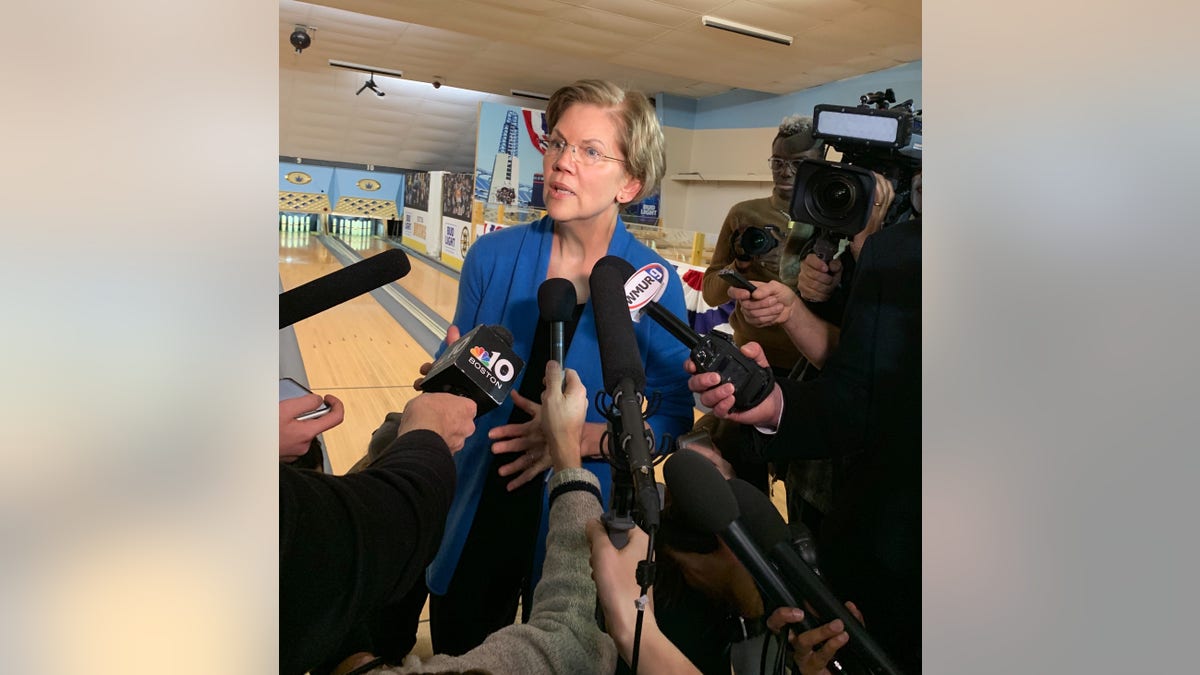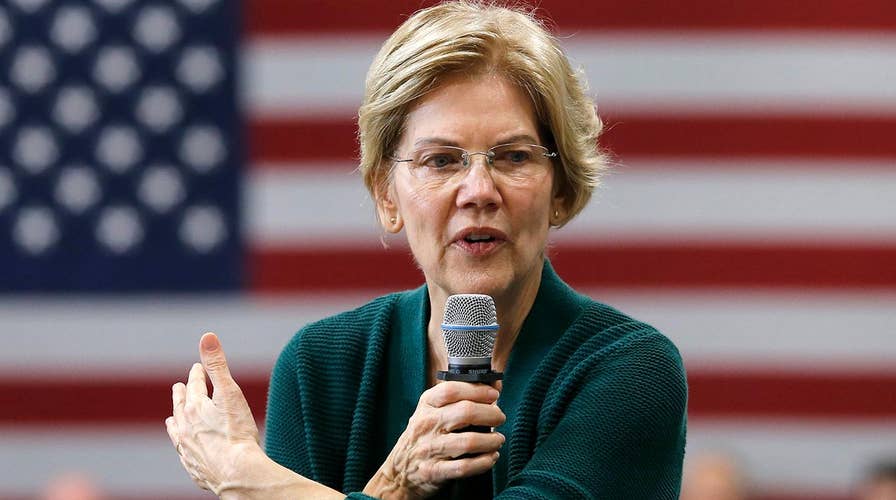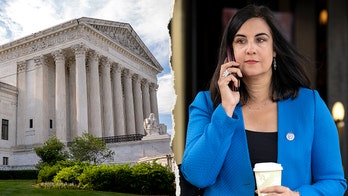From Iowa to New Hampshire to South Carolina, presidential candidate Sen. Elizabeth Warren is shaking up her routine, changing her format on the campaign trail to include more interaction with voters and getting more aggressive with a top-tier rival for the Democratic nomination.
And the progressive senator from Massachusetts appears to continue to back away from a once-orthodox approach toward a government-run, "Medicare-for-all" health care system.
THE LATEST FROM FOX NEWS ON THE 2020 PRESIDENTIAL CAMPAIGN
The changes come as the one-time co-front-runner in the Democratic nomination race has seen her poll numbers deteriorate the past month in national surveys and, more importantly, in polls in Iowa and New Hampshire, the first two states to hold contests in the primary and caucus presidential nominating calendar.
"We're going to try something different," Warren told the crowd a week-and-a-half ago on the campaign trail in Marion, Iowa.
Out was the long stump speech and in was an abbreviated version, which allowed for a big increase in the number of questions she takes from the audience. The trend continued this past weekend in New Hampshire and South Carolina. Warren took 12 questions from the audience Saturday at a town hall in Rye, N.H. -- and 14 Sunday in Charleston, S.C.

Democratic presidential candidate Sen. Elizabeth Warren of Massachusetts holds a town hall at a bowling alley in Peterborough, N.H., on Dec. 6, 2019
The increase in voter participation comes with rewards, and risks. At a town hall Friday at a bowling alley in Peterborough, N.H., a member of the crowd asked about the past controversy over the senator’s claims of Native American ancestry, which dogged her in the early stages of her White House bid.
"I shouldn't have done it. I am not a person of color. I am not a citizen of a tribe. And I have apologized for confusion I've caused on tribal citizenship, tribal sovereignty and for any harm that I've caused," Warren answered.
The populist senator told reporters in Iowa City a week ago that the new campaign format wasn't a reaction to her slippage in the polls, adding "this is a chance to just talk to more people, and hear their questions, and field more questions."
And on Friday in New Hamsphire, she once again downplayed suggestions that the shortened stump speech and increase in voter questions was anything new, saying "I'm delighted to take as many questions as we have time for. I've done it for a long time now."

Democratic presidential candidate Sen. Elizabeth Warren of Massachusetts speaks with reporters after a town hall at a bowling alley in Peterborough, N.H., on Dec. 6, 2019
The drop in the polls came after increased scrutiny of Warren's plans to pay for and implement "Medicare-for-all." Warren continued to swear off raising middle-class taxes to pay for the high price tag attached to the single-payer health care system (roughly $20 trillion in new spending over a decade). And she broke with fellow progressive champion and 2020 rival Sen. Bernie Sanders of Vermont -- who wrote the "Medicare-for-all" bill in the Senate -- over implementation. Warren's transition play would delay the immediate end of privately held insurance.
Warren's been facing incoming fire over "Medicare-for-all" since the summer, first from then-front-runner Joe Biden and a bunch of the lower-tier contenders. This autumn, long-shot-turned-top-contender South Bend Mayor Pete Buttigieg -- as well as middle-tier candidate Sen. Amy Klobuchar of Minnesota -- took aim at Warren over her health care proposals. Polling suggests the onslaught's been successful.
"Warren doesn’t want to talk about health care anymore. She badly lost this policy battle to the moderate flank of the party, which is reflective in her poll numbers," veteran Democratic operative Michael Ceraso said.
In an interview on MSNBC last week, the senator acknowledged that as president, she could sign into a law a health care bill that included a Medicare-type public option -- that's favored by Biden, Buttigieg, Klobuchar and other center-left rivals. Even if the measure didn't include a phase-in for "Medicare-for-all," Warren said: "I will sign anything that helps."
Asked this past weekend by Fox News if signing into law a more modest health care bill flew in the face of her calls for "big structural change," Warren answered: "Not at all."
"We try to do as much good as we can, as quickly as we can. I'm showing you the fights I'll be in on and where I think we should go. And I'll be in that fight. But boy, if I can help 100 million people today, you'd better believe I'd do it, and then I'll get right back into the fight to help another 100 million," she explained.
While playing what appears to be some defense, Warren's also playing some offense, specifically against Buttigieg, who's heavily criticized her the past two months over "Medicare-for-all" and other progressive proposals. She hammered Buttigieg Thursday and Friday over his three-year tenure at consulting firm McKinsey & Company. The firm has been criticized recently for its past work with U.S. Immigration and Customs Enforcement (ICE), authoritarian governments and opioid manufacturers.
Under attack from Warren, Buttigieg reiterated his calls for the consulting firm to release him from a nondisclosure agreement. And on Friday evening, his campaign released new details on his confidential work. On Monday, McKinsey gave Buttigieg permission to release the names of the clients he served during his tenure with the firm.
Warren also took aim at Buttigieg over his closed-door top-dollar fundraisers. Unlike Biden, Buttigieg has not previously opened his fundraisers to press coverage. While her aggressive jabs at Buttigieg were a departure from her past general avoidance of criticizing rivals, attacking corruption in government has been a core message of her campaign dating back to the launch of her White House bid at the beginning of the year.
"We have other candidates who have decided to finance their campaigns by doing closed-door fundraisers, sucking up to the corporate executives, the millionaires, the billionaires," she told the crowd at a town hall Sunday in Charleston, S.C., as she targeted Buttigieg.
Warren's full-court press was successful, as Buttigieg aides on Monday announced he will open fundraisers to reporters and will release the names of people raising money for their campaign.
Buttigieg's campaign returned fire, urging Warren to release her tax returns from before 2008, when she had corporate clients similar to the giant corporations she now rails against. Warren -- under pressure -- announced on Sunday that she earned nearly $2 million from private legal work since 1986.
WARREN REVEALS SHE MADE $1.9 MILLION FROM PRIVATE LEGAL WORK
While likely a reaction to her poll position, Ceraso believes Warren's change-up on the campaign trail could pay off.
"Warren’s tactic is to move the conversation away from her health care liability and use Pete's missteps as a backdrop to discuss the needs for transparency and structural change in government, two issues that propelled her to front-runner status in the fall," said Ceraso, a veteran of the 2016 Bernie Sanders campaign who served as the 2020 Buttigieg New Hampshire state director before parting ways with the campaign this past summer.
"All of this gives Warren the ability to use the media to reintroduce her biography and the historical implications of her candidacy to voters," he explained.













































